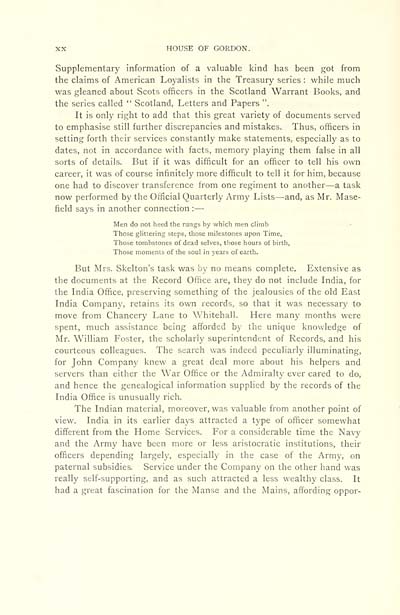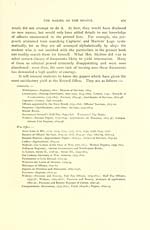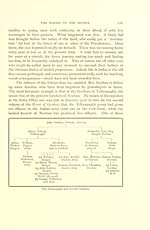New Spalding Club > House of Gordon > Gordons under arms
(30) Page xx
Download files
Complete book:
Individual page:
Thumbnail gallery: Grid view | List view

XX HOUSE OF GORDON.
Supplementary information of a valuable kind has been got from
the claims of American Loyalists in the Treasury series : while much
was gleaned about Scots officers in the Scotland Warrant Books, and
the series called " Scotland, Letters and Papers ".
It is only right to add that this great variety of documents served
to emphasise still further discrepancies and mistakes. Thus, officers in
setting forth their services constantly make statements, especially as to
dates, not in accordance with facts, memory playing them false in all
sorts of details. But if it was difficult for an officer to tell his own
career, it was of course infinitely more difficult to tell it for him, because
one had to discover transference from one regiment to another — a task
now performed by the Official Quarterly Army Lists — and, as Mr. Mase-
field says in another connection : — •
Men do not heed the rungs by which men climb
Those glittering steps, those milestones upon Time,
Those tombstones of dead selves, those hours of birth.
Those moments of the soul in years of earth.
But Mrs. Skelton's task was by no means complete. Extensive as
the documents at the Record Otfice are, they do not include India, for
the India Office, preserving something of the jealousies of the old East
India Company, retains its own records, so that it was necessary to
move from Chancery Lane to Whitehall. Here many months were
spent, much assistance being afforded by the unique knowledge of
Mr. William Foster, the scholarly superintendent of Records, and his
courteous colleagues. The search was indeed peculiarly illuminating,
for John Company knew a great deal more about his helpers and
servers than either the War Office or the Admiralty ever cared to do,
and hence the genealogical information supplied by the records of the
India Office is unusually rich.
The Indian material, moreover, was valuable from another point of
view. India in its earlier days attracted a type of officer somewhat
different from the Home Services. For a considerable time the Navy
and the Army have been more or less aristocratic institutions, their
officers depending largely, especially in the case of the Army, on
paternal subsidies. Service under the Company on the other hand was
really self-supporting, and as such attracted a less wealthy class. It
had a great fascination for the Manse and the Mains, affording oppor-
Supplementary information of a valuable kind has been got from
the claims of American Loyalists in the Treasury series : while much
was gleaned about Scots officers in the Scotland Warrant Books, and
the series called " Scotland, Letters and Papers ".
It is only right to add that this great variety of documents served
to emphasise still further discrepancies and mistakes. Thus, officers in
setting forth their services constantly make statements, especially as to
dates, not in accordance with facts, memory playing them false in all
sorts of details. But if it was difficult for an officer to tell his own
career, it was of course infinitely more difficult to tell it for him, because
one had to discover transference from one regiment to another — a task
now performed by the Official Quarterly Army Lists — and, as Mr. Mase-
field says in another connection : — •
Men do not heed the rungs by which men climb
Those glittering steps, those milestones upon Time,
Those tombstones of dead selves, those hours of birth.
Those moments of the soul in years of earth.
But Mrs. Skelton's task was by no means complete. Extensive as
the documents at the Record Otfice are, they do not include India, for
the India Office, preserving something of the jealousies of the old East
India Company, retains its own records, so that it was necessary to
move from Chancery Lane to Whitehall. Here many months were
spent, much assistance being afforded by the unique knowledge of
Mr. William Foster, the scholarly superintendent of Records, and his
courteous colleagues. The search was indeed peculiarly illuminating,
for John Company knew a great deal more about his helpers and
servers than either the War Office or the Admiralty ever cared to do,
and hence the genealogical information supplied by the records of the
India Office is unusually rich.
The Indian material, moreover, was valuable from another point of
view. India in its earlier days attracted a type of officer somewhat
different from the Home Services. For a considerable time the Navy
and the Army have been more or less aristocratic institutions, their
officers depending largely, especially in the case of the Army, on
paternal subsidies. Service under the Company on the other hand was
really self-supporting, and as such attracted a less wealthy class. It
had a great fascination for the Manse and the Mains, affording oppor-
Set display mode to: Large image | Transcription
Images and transcriptions on this page, including medium image downloads, may be used under the Creative Commons Attribution 4.0 International Licence unless otherwise stated. ![]()
| Publications by Scottish clubs > New Spalding Club > House of Gordon > Gordons under arms > (30) Page xx |
|---|
| Permanent URL | https://digital.nls.uk/79781057 |
|---|
| Description | Volumes 47-53 are uniform with but not part of the club's series. |
|---|---|

